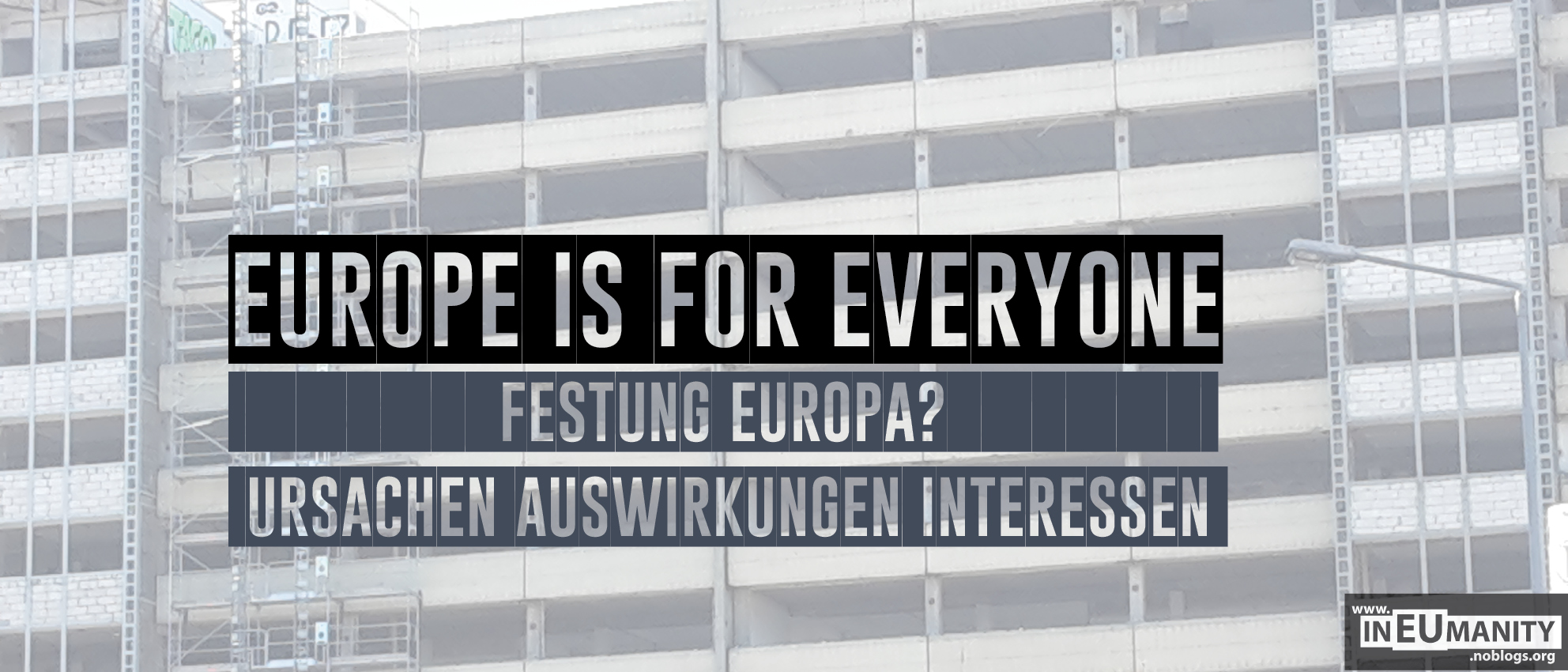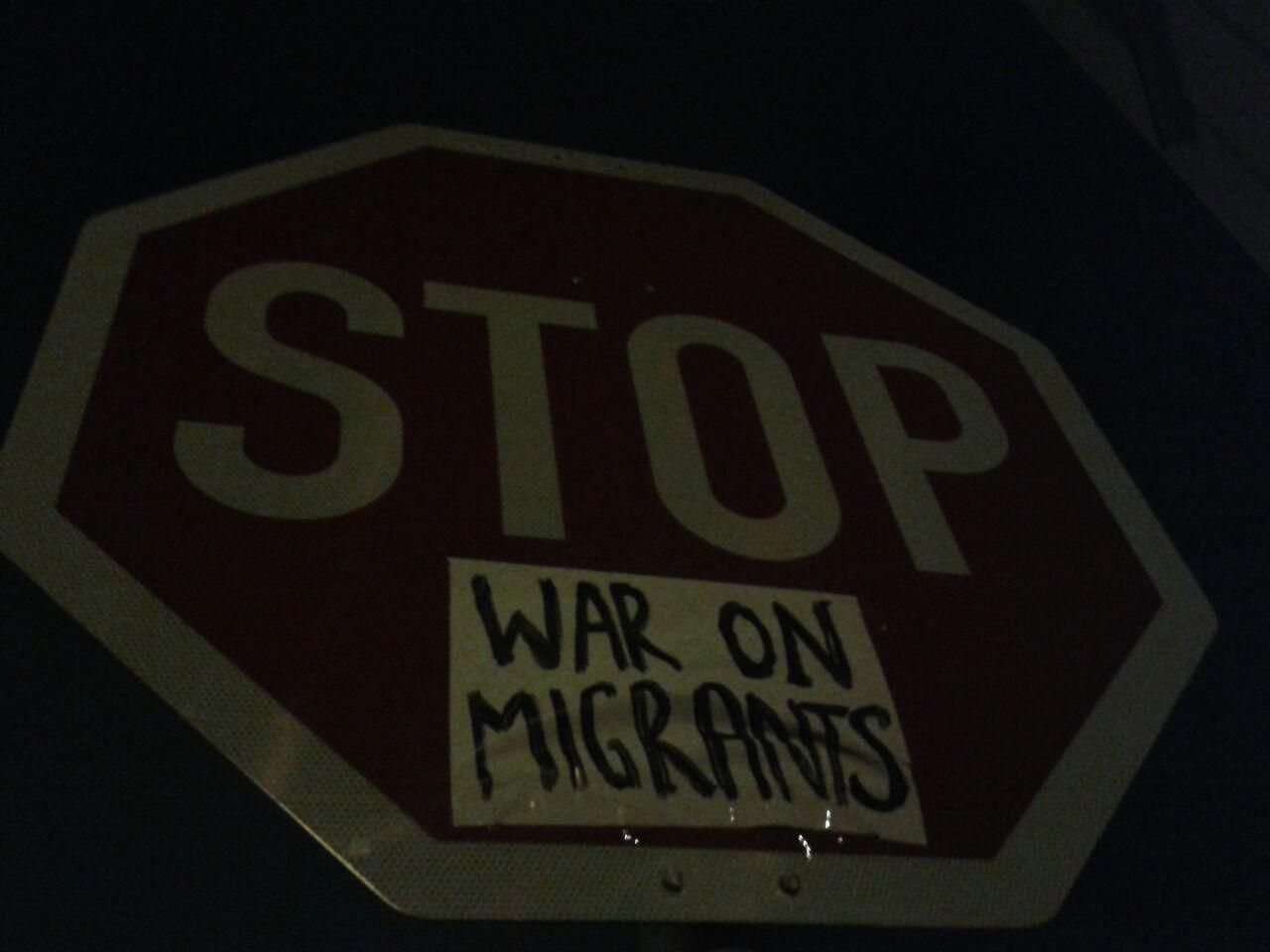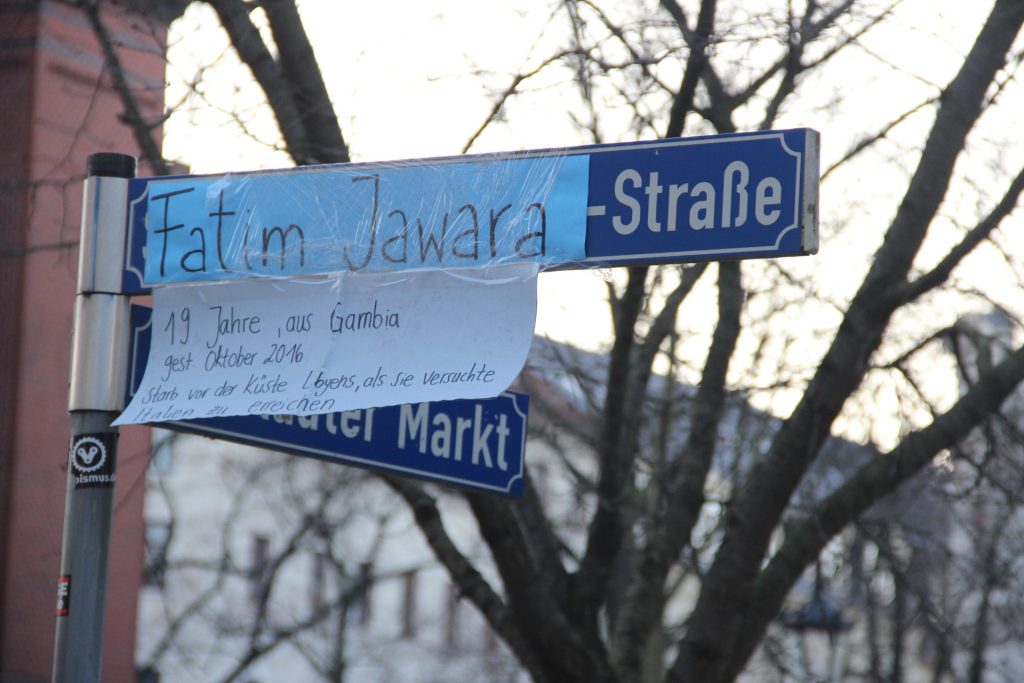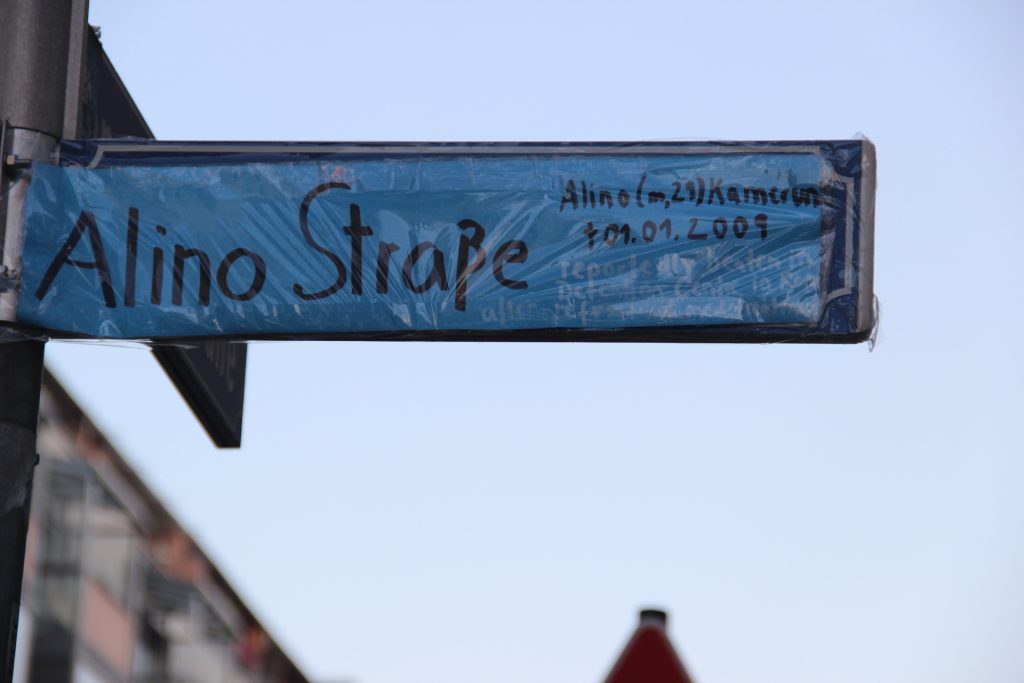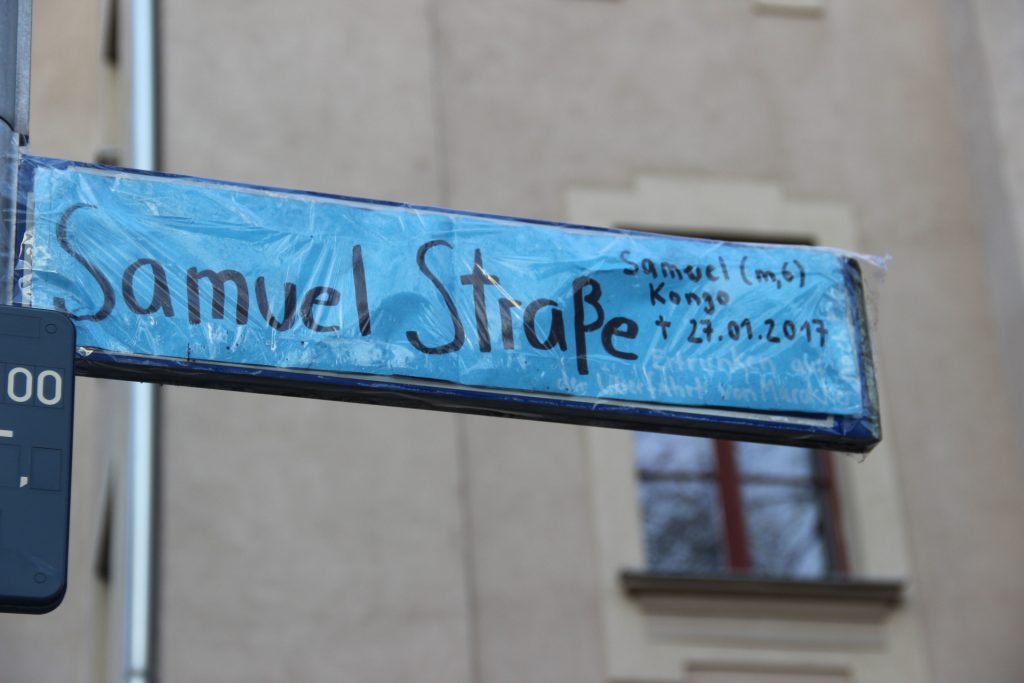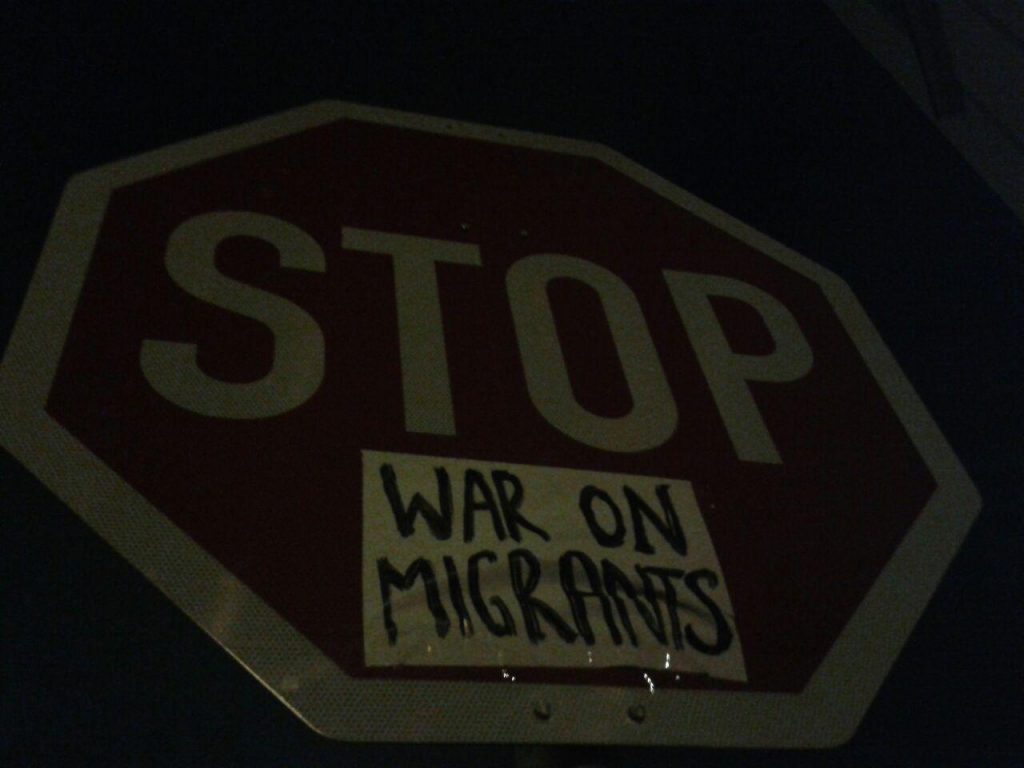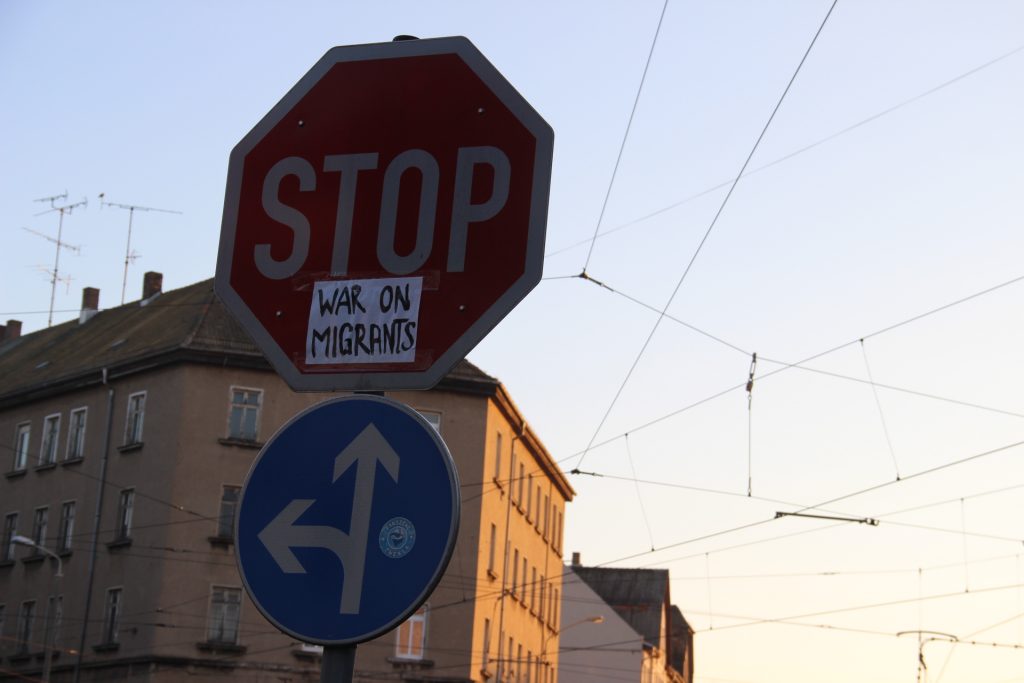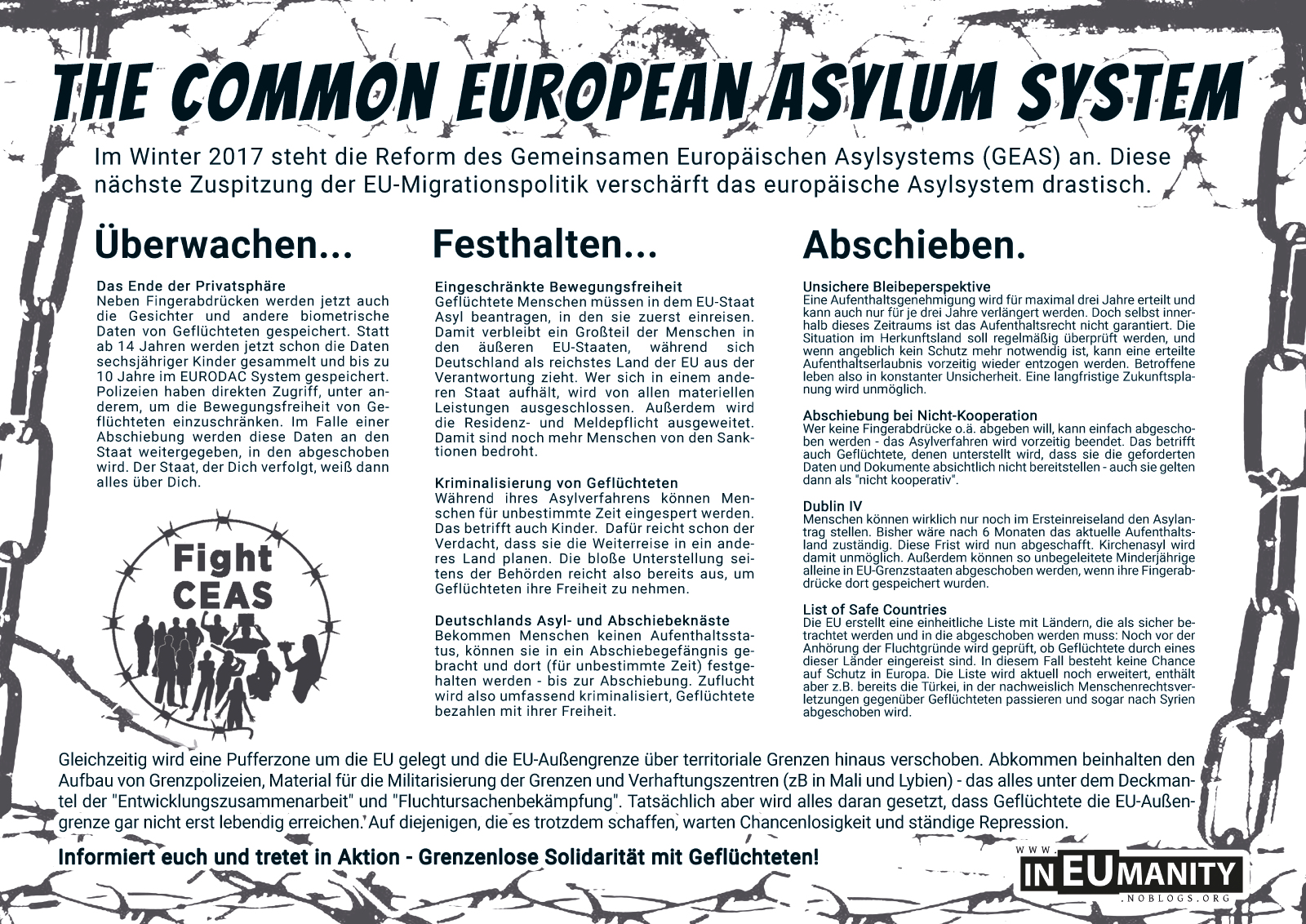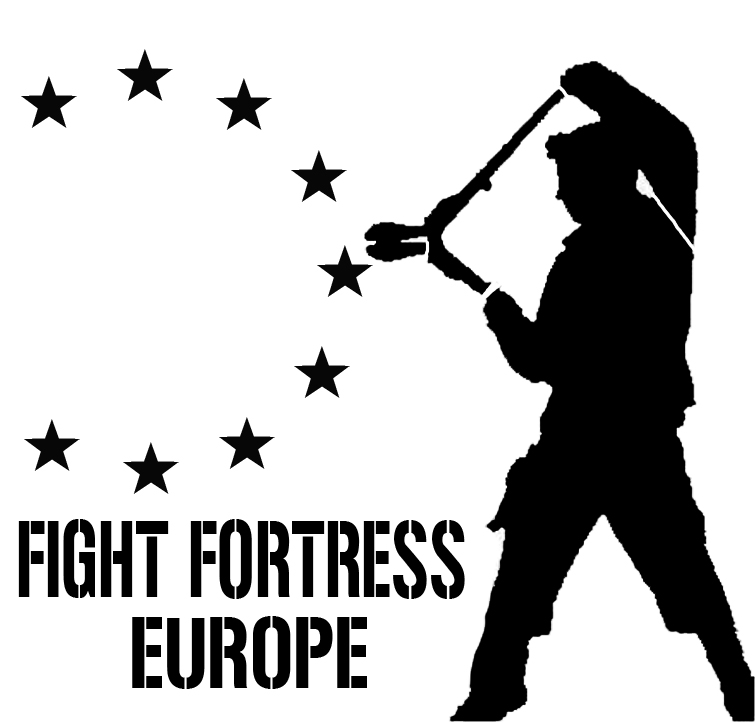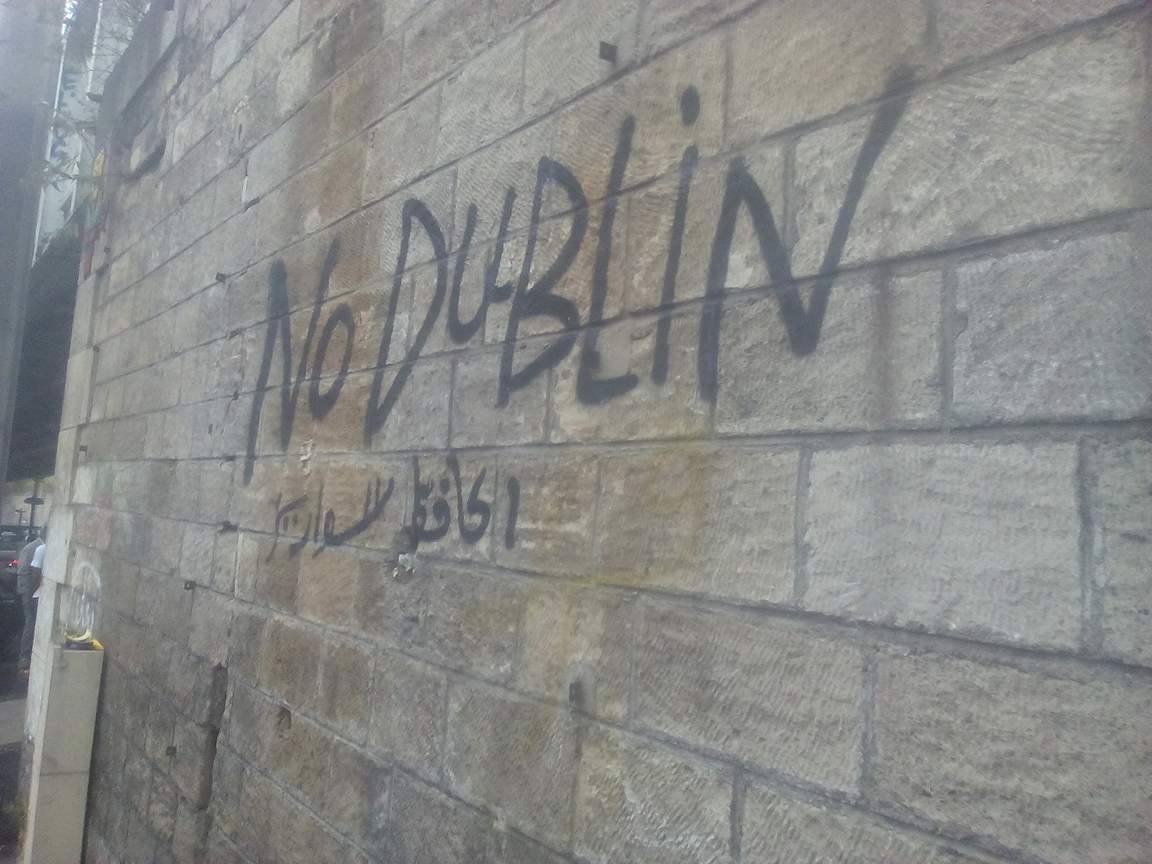18th of December: International Day against War on Migrants
[Eine deutsch-sprachige Version findet sich weiter unten]
After the self-organized project Hotel City Plaza Athens called for international action days to give more attention to the deadly consequences for and dramatic circumstances of refugees, we took part with a small action in Leipzig.
For this reason we gave some streets new names. These names represent thousands of people who had to leave their homes, trying to get out off a situation which is precarious and often dangerous for them and their family in order to seek a new life-perspective and safety from persecution, war or marginalization/exclusion.
Our criticism is directed towards the politics of the European Union, which on one hand (initially) is creating causes for people fleeing by establishing unfair trade agreements based on capitalistic exploitation. Among others, consequences of these agreements are thereby emerging dependence, unemployment and poverty.
Since the publishing of numerous video recordings from civil sea rescue groups it is known and no secret, that refugees do not only die due to the denial of assistance or because of hindrance from legal possibilities, but also get killed actively through EU supported groups, like e.g. the Libyan coastguards.
But even if they overcome the hurdle of Fortress Europe’s borders, endangering life and health, they must face and live within a state of constant uncertainty IF to get permission to stay. A state of marginalization based on racist and nationalist reasons and over all the danger of denied access to physical support of life-essentials in the state of their arrival.
These are as well causes of an EU-policy mainly shaped by economically superior powerful member-states, which thereby realize their interest to leave the responsibility in the hands of a few states like Greece or Italy, which are forced to deal with the situation.
The majority of people’s names who are suffering and dying under this system are mostly unknown.
With our action we aim to raise attention for this injustice. Therefore we set a symbol: These persons, their names are and will not be forgotten.
Fight Fortress Europe!
In Solidarity with all refugees.
[DEUTSCH]
Aktion zum 8. Dezember: Internationaler Tag gegen den Krieg gegen Geflüchtete
Nachdem das selbstorganisierte Wohnprojekt Hotel City Plaza Athen zu einem internationalen Aktionstag aufgerufen hat, um auf die oft tödlichen, aber in jedem Fall menschenunwürdigen Lebensumständen von Geflüchteten aufmerksam zu machen, haben wir uns mit einer kleinen Aktion in Leipzig daran beteiligt.
Zu diesem Anlass haben wir einigen Straßen neue Namen gegeben. Diese Namen stehen stellvertretend für tausende Menschen, die sich auf dem Weg aus einer prekären oder für sie und ihre Familie gefährlichen Situation machen, um in Europa neue Lebensperspektiven und Sicherheit vor Verfolgung, Krieg oder Ausgrenzung zu suchen.
Unsere Kritik richtet sich damit an die Politik der Europäischen Union, die zum einen die Ursachen für die Flucht von Menschen aufgrund unfairer, auf kapitalistischer Ausbeutung beruhender Handelsabkommen und der damit verbundenen Abhängigkeit, Arbeitslosigkeit und Armut auch mit verursacht.
Dass Geflüchtete nicht nur durch unterlassene Hilfeleistung oder die Verwehrung legaler Wege umkommen, sondern auch durch, von der EU unterstützte Gruppen wie bspw. die Lybische Küstenwache, aktiv getötet werden, ist seit den zahlreichen Veröffentlichungen von Videoaufnahmen von zivilen Seenotrettungsgruppen wie von Sea Watch, kein Geheimnis.
Doch selbst wenn sie die Grenzen der Fortress Europe (der europäischen “Festung”?!) unter einem enormen Risiko für ihr Leben und ihre Gesundheit überwunden haben, erwartet sie ein Zustand ständiger Unsicherheit bleiben zu dürfen, die Ausgrenzung aufgrund von rassistischen und nationalistischen Gründen und, vor allem in den Staaten, in denen sie zuerst ankommen, die Gefahr keine Unterstützung in Form von materieller Versorgung zu bekommen.
Auch das sind Folgen von einer EU-Politik, die maßgeblich durch wirtschaftsstarke Mitgliedsstaaten, wie Deutschland, geprägt wird und die ihrem Interesse, Verantwortung bei bspw. Griechenland und Italien zu belassen, dadurch Rechnung tragen.
Die meisten Namen von den Menschen, die unter diesem System leiden und sterben sind weitesgehend unbekannt.
Wir wollen durch unsere Aktion das Bewusstsein der Menschen hier für diese Ungerechtigkeit schärfen und sinnbildlich ein Symbol setzen, dass sie nicht vergessen sind.
Fight Fortress Europe!
In Solidarity with all refugees.
Speech at demonstration against the ‘Innenministerkonferenz’ in Leipzig
Presseschau zur Situation von Geflüchteten in Libyen
Die folgende Auswahl an Zitaten und Zusammenfassungen von Berichten internationaler und deutscher Medien, soll dazu dienen Menschen über die Lage von Geflüchteten in Libyen zu informieren. Neben Einschätzungen über das Ausmaß der Menschenrechtsverstöße, soll vor allem auch der Einfluss und die Beteiligung von europäischen und deutschen Politiker_Innen beleuchtet werden, die mit Maßnahmen zur Durchsetzung des europäischen Grenzregimes die momentane Situation erzeugt haben.
Am 29.01.2017 erscheint in der Welt am Sonntag ein längerer Artikel, in dem aus einem Bericht des Auswärtigen Amtes zitiert wird, darin ist die Rede von „allerschwerste[n], systematische[n] Menschenrechts- verletzungen gegen Flüchtlinge in Libyen.“ Berichte von Geflüchteten liegen zahlreichen NGOs und Supporter_innen schon länger vor. Die Welt am Sonntag konstatiert: „In dem Schreiben fassen zwei Diplomaten die Aussagen von Migranten zusammen, die aus Flüchtlingsgefängnissen im Nachbarland entkommen waren und nun in Aufnahmezentren der Internationalen Organisation für Migration (IOM) im Niger leben. Was die Migranten berichten, ist nicht unbedingt neu. Außergewöhnlich ist jedoch, wie drastisch die Situation nun offiziell für die höchste politische Ebene beschrieben wird.“. Der Artikel enthält des Weiteren einige Details zu den Ausmaßen der Situation vor Ort, so schreibt die Welt am Sonntag: „Authentische Handy-Fotos und Videos belegten “KZ-ähnliche Verhältnisse” in den Flüchtlingsgefängnissen. Folter, Vergewaltigungen und Exekutionen seien für jene „an der Tagesordnung“, die nicht genug zahlen könnten. „Wir sind weniger Wert als Hunde“, berichten ehemalige Insassen.
Wenige Tage danach veröffentlicht Tagesschau eine Recherche zur Kooperation der EU mit der libyschen Einheitsregierung. So soll auch weiterhin unter Zusammenarbeit mit der Einheitsregierung in Tripolis die libysche Küstenwache unterstützt werden und Geflüchtete auch vermehrt wieder nach Libyen zurückgeschickt werden. Natürlich beruft sich die EU darauf, besserer Bedingungen in Libyen schaffen zu wollen. Unter Bezug auf die chaotische Situation in Libyen und Berichte über massive Menschenrechtsverletzungen zitiert Tagesschau auch Kritiker_Innen. So kommt Arjan Hehenkamp im Artikel zu Wort, Geschäftsführer von Ärzte ohne Grenzen: „Dieser Plan ist entweder gefährlich naiv oder gefährlich zynisch“ und weiter heißt es im Artikel: „[Arjan Hehenkamp] sieht keinen Partner vor Ort, mit dem eine internationale Kooperation möglich wäre. Die Lage im Land sei völlig unübersichtlich und den einzelnen Akteuren sei nicht zu trauen.“.
Quelle: https://www.tagesschau.de/inland/libyen-fluechtlinge-111.html
Im Juni berichtet The Independent von den katastrophalen Zuständen und zieht vor allem die Linie zur internationalen Politik. So schreiben sie: “Smugglers and armed gangs have exploited lawlessness, since the UK and France led a military campaign to oust Muammar Gaddafi, to expand their ruthless trade, and it is frequently unclear whether squalid detention centres are run by officials, militias or both.”. Über die Rolle der EU heißt es des Weiteren in dem Artikel: “ Following a show of commitment at a summit attended by EU leaders in Malta in February, a €90m (£80m) programme to “reinforce protection and resilience of migrants, refugees and host communities in Libya” was adopted last month.
More than half of the funds are allocated to disembarkation points for migrants forced back by the Libyan coastguard, detention centres, healthcare, protection for vulnerable groups and 15,000 “voluntary humanitarian returns” to countries of origin.[…] Another €42m (£37m) is going to “socio-economic development” for Libya’s Government of National Accord (GNA), which is itself accused of working with smugglers and militias, as well as perpetrating abuse in detention centres including torture and murder.”
Im August berichtet dann die Tagesschau über einen Militäreinsatz den Italien zusammen mit Libyen ausgehandelt hat. Seitdem unterstützt Italien in Absprache mit Tripolis die libysche Küstenwache innerhalb des libyschen Hoheitsgewässers bei der „Bekämpfung von Schleppern.” Neben dem Hinweis, dass dies auch für andere europäische Länder in Verhandlung ist, berichtet Tagesschau auch über kritische Stimmen zur Mission: „Menschenrechtsorganisationen hatten einen möglichen italienischen Einsatz in Libyen im Vorfeld scharf kritisiert. Sie befürchten, Italien überlasse die Migranten einem schrecklichen Schicksal. In den libyschen Flüchtlingslagern seien Folter, Vergewaltigungen und Mord an der Tagesordnung.” Statt Schiffe zu senden, um Menschenleben zu retten und verzweifelten Migranten und Flüchtlingen Schutz zu geben, bereitet sich Italien darauf vor, Kriegsschiffe zu schicken, um diese zurückzudrängen”, sagte der Geschäftsführer der Menschenrechtsorganisation Amnesty International für Europa, John Dalhuisen. Die italienische Regierung verfolge eine “beschämende Strategie”. “
Quelle: https://www.tagesschau.de/ausland/italien-libyen-101.html
Am 9.August veröffentlicht Oxfam auf ihrer Internetseite Ergebnisse einer Befragung von Geflüchteten in Sizilien, die über das Mittelmeer aus Libyen gekommen sind. In dem kurzen Artikel finden sich erschreckende Zahlen, so heißt es in dem Artikel: „158 Interviews mit 31 Frauen und 127 Männern, die Oxfam und Partnerorganisationen mit Geflüchteten in Sizilien geführt haben, zeichnen ein dramatisches Bild der Lage in Libyen: Nahezu alle befragten Frauen haben sexuelle Gewalt erlebt.[…] 74 Prozent der Geflüchteten sagten aus, Folter und/oder Mord an Reisegefährten beobachtet zu haben; 84 Prozent berichteten, selbst Opfer unmenschlicher und entwürdigender Behandlung wie körperlicher Gewalt oder Folter geworden zu sein.[…] 80 Prozent der Befragten gaben an, ihnen sei in Libyen regelmäßig Nahrung und Wasser verweigert worden.“
Auch Deutschlandfunk kritisiert die momentane Situation von Geflüchteten in Libyen und beleuchtet dabei vor allem die Rolle der lybischen Küstenwache und deren Übergriffe auf unabhängige NGOs. So enthält die Reportage folgende Zeilen: „Damit ist jetzt Schluss: Libyens Küstenwache erweiterte ihren Einsatz auch über die Zwölf-Meilen-Zone hinaus und sagte den Hilfsorganisationen in ihren Gewässern den Kampf an – das Schiff einer spanischen NGO wurde ernsthaft bedroht.[…] Doch der Deal, den Italien mit Libyen geschlossen hat, ist für Europa attraktiv. Im Prinzip beinhaltet er: Libyen wird finanziell und materiell unterstützt, dafür sammelt die libysche Küstenwache möglichst viele Flüchtlinge ein. Denn, so Ärzte ohne Grenzen: Retten europäische Hilfsorganisationen Flüchtlinge, können sie die Flüchtlinge laut internationalem Recht nicht nach Libyen zurückbringen, weil dort ihr Leben in Gefahr ist. Wenn die libysche Küstenwache allerdings die Flüchtlinge aufgreift, sieht das völlig anders aus. Nach Angaben der Internationalen Organisation für Migration wurden allein in diesem Jahr schon 12.000 Menschen auf diesem Wege zurück nach Libyen gebracht.“
Auf netzpolitik.org erschien Anfang des Monats, am 9.10.2017, ein kritischer Kommentar, in welchem von einem Dokument über die Lage in libyschen Flüchtlingslagern die Rede ist, welches vom Auswärtigen Amt zurückgehalten wird. Neben einem allgemeinen Plädoyer für mehr Transparenz und Zurückhaltung in der Einschränkung des Informationsfreiheitsgesetzes, enthält der Artikel die Rechtfertigung des betreffenden Amtes. Dazu schreibt netzpolitik.org: „Die Berichte sind also politisch brisant, zumal die Europäische Union das libysche Regime finanziell und logistisch dabei unterstützt, Flüchtlinge vom Übersetzen nach Europa abzuhalten. Nach dem Willen des Auswärtigen Amts soll der Bericht jedoch geheim bleiben. Der Grund: Das Amt befürchtet bei einer Veröffentlichung des Berichts nach einer Anfrage per Informations-freiheitsgesetz „nachteilige Auswirkungen auf die internationalen Beziehungen“ zu den Machthabern in Libyen sowie der Regierung in Niger.“
Die Presseschau gibt es hier als PDF-Download.
Update: The Common European Asylum System
We have updated our info-sheet about the Common European Asylum System:
September 2017, ineumanity malmö
The Common European Asylum System (CEAS) is a set of bills aimed at further harmonizing European asylum policy.
The system consists of seven bills. Each bill has its own rapporteur and its own separate process. The seven rapporteurs form a group called the “Asylum Contact Group”. These rapporteurs play an important role in the harmonization process, since they are the ones suggesting amendments and proposing compromises. All of these proposals are currently being negotiated, which means they might change. In this document, we present parts of the proposals.
THE SEVEN BILL S OF THE CEAS:
1 – qualification regulation
2 – procedures regulation
3 – eures ettlement framework regulation
4 – eurodac
5 – dublin iv
6 – reception directive
7 – easo , eu agency for asylum (will shortly change name to euaa)
Wallpaper out: ‘The Common European Asylum System’
Contact us if you want…
…the original file for printing.
…some copies but can’t print them on your own. We will try to send you some.
Click the image for full size
Have a look at our material-page for more posters, flyers and other nice propaganda…
Rechercheergebnisse: EU Grenzregime – Ursachen, Strategien und Konsequenzen
Continue reading “Rechercheergebnisse: EU Grenzregime – Ursachen, Strategien und Konsequenzen”
Life’s Good – For Whom?
Down and out in Paris revisited: An Impression
Next to the traffic ligh
Queues
City of love
“We came here with a lot of energy to work, to do something, to live. But for a lot of us, here under the bridge we live a life previously unknown to us: passive, without dignity. The waiting and insecurity makes us crazy. There are no possibilities to do something, to build on something. Look at this place, look at us. What do you think? Like this, we cannot use our energy and our qualities.”
Dublin deportations
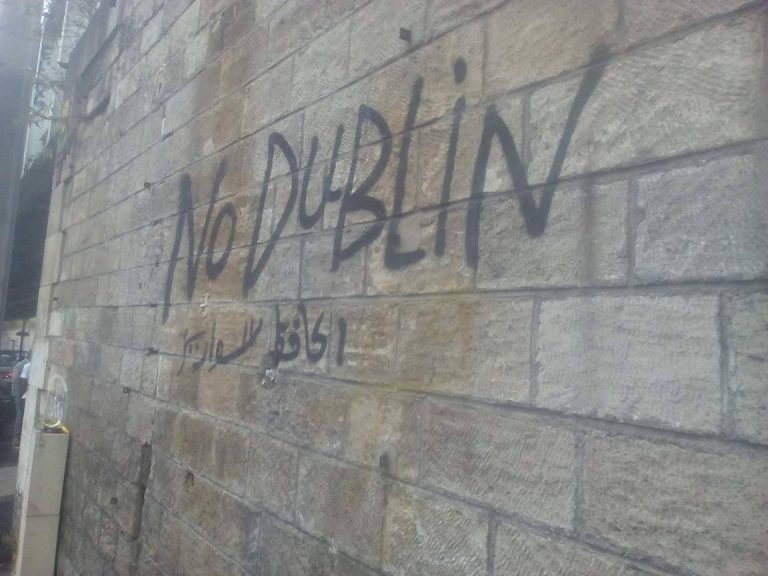
Good life only with pass
Fascism and Violence in Refugee and Migrant Camps
Last week, 2nd of August, a refugee has been attacked by a group of fascists near a refugee camp in Sombor. Around 9pm the man walked some meters out of the camp to get his things which he left in the forest near the camp where the residents of the camp use to sit together, wash their clothes and where they also sleep sometimes. Around 15 meters in front of the camp he had to face seven men who started to beat him with metal weapons. He tried to run away and just one meter in front of the camp he was caught again by the group who followed him with a motorbike. Suddenly five of them attacked the man with knives. He was injured very badly and had to go to the hospital. A group of refugees went to the responsible person of the camp the same night and told him that what happened made them feel very unsafe and that the camp and the place around it should be a safe space for the people living there. In their daily reports AreYouSyrious wrote that the boss of the camp said that it “wouldn’t be a problem for him if the residents should die”(1) . This incident was also confirmed by another person we know in this camp. The next evening again fascist men came to the camp and this time many camp residents went out to defend themselves. One of our contacts told us that they don’t feel safe and need protection.
Continue reading “Fascism and Violence in Refugee and Migrant Camps”
Afghanistan is Not Safe – Stop Deportations
Structural Violence
This year some activists have been in the Balkan talking to refugees who are trying to enter the EU for several months already, and all they face is violence.
They told them about the police violence in different countries they passed through, about the border violence at all borders which they tried to cross several times and the systematical push backs, about the state violence in places where they tried to get some rest like in Belgrade. In Belgrade they experienced segregation between them and local people in the way that they were totally ignored through the citizens of Belgrade. This was another form of violence, a mental violence; the feeling of not existing, having nothing to do all day for several months, just waiting for a next possibility to cross a border.
Life full of violence
Most people we have met in Belgrade have fled their countries because of violence. Two boys of 16 and 17 years told us about their experiences and lives in Afghanistan, in the provinces Pishawar and Baghlan. They told about different powers in this country: The Afghan government and army, the Taliban, American Forces and Dahesh (IS) to mention the most well-known. For these players, the country is just a place to demonstrate their power, a place were lives of other people don’t matter.
By telling the story of their lives, the two boys showed how inhuman live in Afghanistan is, always in fear of aggression, loss and death. Reports of the UN show that there were more than 1 million refugees in and outside of Afghanistan in 2016. These boys are still not safe and there is not much hope for them to get asylum and to have the opportunity to start their lives here, because Afghanistan is still classified as a safe country.
We need to stop this war,
we need to stop sending people back to this war,
we need to stop deportations!
Stop war, stop weapon trade, the enemy is capitalism!

